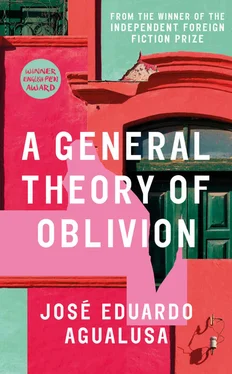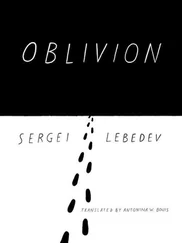‘People who are missed by other people, they are the ones who go to Paradise. Paradise is the space we occupy in other people’s hearts. That’s what my grandmother used to tell me. I don’t believe it. I’d like to believe in anything that’s so simple — but I lack faith.’
Monte had people to cry for him. I find it hard to imagine him in Paradise. Perhaps, however, he’s being purged in some obscure nook of immensity, between the serene splendour of Heaven and the twisted darkness of Hell, playing chess with the angels who are guarding him. If the angels know how to play, if they play well, this would be almost Paradise to him.
As for Horácio Capitão, old Didn’t-I-Tell-You, he spends his afternoons in a rundown bar on Ilha, drinking beer and arguing about politics, in the company of the poet Vitorino Gavião, Artur Quevedo, and another two or three aged cadavers from the old days. To this day he doesn’t recognise Angola’s Independence. He believes that just as communism ended, so one day Independence will end, too. He still breeds pigeons.
THE CONFESSION OF JEREMIAS CARRASCO
Let us return to the morning when Nasser Evangelista, overcome by the echo of dark voices, hurled himself at Monte and stabbed him. Amid the confusion of people gathering at Ludo’s door, there were two characters in black, as you might recall, who stood out. The old lady noticed them after Monte’s shameful flight and the (also hurried) exit of Baiacu. She noticed them, but had no way of knowing what they had come for since, in the meantime, Daniel Benchimol had begun to read the letter that Maria da Piedade Lourenço had written to the managing director of the Jornal de Angola .
The two men waited for the journalist to finish. They bore silent witness to Ludo’s anguish, to the tears wiped away with the back of her hand. Finally Daniel withdrew, promising to write to Maria da Piedade, and the two men stepped forward. The older of the two held out his hand to Ludo, but it was the younger who spoke:
‘May we come in, auntie?’
‘What do you want?’
Jeremias Carrasco took a notebook from his jacket pocket and wrote something quickly in it. He showed it to Ludo. The woman shook her head:
‘I can see it’s a notebook. I can’t read the letters any more. Are you a mute?’
The young man read aloud:
‘Let us in — please. I need your forgiveness, and your help.’
Ludo faced up to them, obstinately:
‘I have nowhere for you to sit. It’s been thirty years since I’ve had visitors.’
Jeremias wrote again, then showed the notebook to his son:
‘We’ll stand. My father says that chairs, even the best ones, don’t improve conversations.’
Ludo let them in. Sabalu went to fetch four old oilcans. They sat down on them. Jeremias looked in horror at the cement floor, the dark walls scratched in charcoal. He took off his hat. His shaved skull shone in the gloom. He wrote again in his notebook.
‘Your sister and brother-in-law died in a car accident,’ read the son. ‘It was my fault. I killed them. I met Spike in Uíge, at the start of the war. He was the one who sought me out. Someone told him about me. He needed my help to run a sting on the Diamang mining company. A good clean job, done well, with no blood spilled and no confusion. We agreed that I’d keep half the stones. I did what I had to do, it all worked out, but at the last minute old Spike ran off. I was left empty-handed. He never thought I’d come after him to Luanda. He didn’t know me. I travelled into the city, which was surrounded by Mobutu’s troops and our own people, a crazy venture, and by looking here and there, within a couple of days, I found him at a party on Ilha. He fled as soon as he saw me. I chased after him in my car, like in the movies. Then he went off the road and crashed into a tree. Your sister died at once. Spike lived long enough to tell me where he’d hidden the diamonds. I’m very sorry.’
António read with some difficulty. Perhaps because of the lack of light, perhaps because he wasn’t used to reading, perhaps because it was hard for him to believe what the words said. When he’d finished he looked up at his father, amazement in his eyes. The old man was leaning back against the wall. He was having trouble breathing. He took the notebook from António’s hands and wrote again. Ludo raised her hand in a vague, agonised gesture, trying to prevent him:
‘Don’t torture yourself any more. Our mistakes correct us. Perhaps we need to forget. We should practise forgetting, reaching for oblivion.’
Jeremias shook his head, irritated. He scribbled a few more words in the little notebook. He handed it to his son.
‘My father doesn’t want to forget. Forgetting is dying, he says. Forgetting is surrender.’
The old man wrote again.
‘My father is asking me to talk about my people. He wants me to tell you about the oxen, the oxen are our wealth, but they’re not goods for buying and selling. We like to hear the cries of the oxen.’
In his isolation among the Mucubals, Jeremias had been reborn not as another person, but as many — as another people. Before then he had been surrounded by others. At the very best, he was an individual with his arms around others. In the desert, he felt for the first time as though he were a part of it all. Some biologists argue that a single bee, a single ant, is nothing more than the mobile cells of one individual. The true organisms are the beehive and the ant nest. A Mucubal, too, can exist only with others.
As António struggled to read his father’s explanations, Ludo recalled some lines from Fernando Pessoa: I feel sorry for the stars / Which have shined for so long, / So long, so long … / I feel sorry for the stars. // Is there not a weariness / Felt by things, / By all things, / Such as we feel in our limbs? // A weariness of existing, / Of being, / Just of being, / Whether sad or happy … // Is there not, finally, / For all things that are, / Not just death / But some other finality? / Or a higher purpose, / Some kind of pardon?
António was talking about the new landowners, about the barbed wire that divided up the desert, cutting off the access paths to the pastures. Responding with gunfire led to terrible wars, in which the Mucubals lost their cattle, they lost their souls, their liberty. That’s how it had been in 1940, when the Portuguese killed almost all the people, sending the survivors as slaves to the São Tomé plantations. The alternative solution, according to Jeremias, would be to buy land, the same land that once belonged to the Kuvale, the Himba, the Muchavicua, and which today belongs to generals and wealthy businessmen, many of whom have no connection to the vast southern sky.
Ludo got up, went to fetch the two diamonds that were left, and handed them over to Jeremias.
Often, when I used to look in a mirror, I’d see him behind me. I no longer do. Perhaps because I see so poorly now (a benefit of blindness), perhaps because we’ve replaced the mirrors. As soon as the money for the apartment came in, I bought new mirrors. I got rid of the old ones. My neighbour found this strange:
‘The only things in decent condition in your apartment are the mirrors.’
‘No!’ I got annoyed. ‘The mirrors are haunted!’
‘Haunted?!’
‘That’s right, dear neighbour. They’re full of shadows. They’ve spent too long in a state of solitude.’
I didn’t want to tell him that often, when I looked into the mirrors, I saw looming over me the man who raped me. In those days I still used to leave the house. I led an almost normal life. I’d go to and from school, by bicycle. In the summer we’d rent a house on the Costa Nova. I’d go swimming. I liked swimming. One afternoon, as we arrived home from the beach, I realised I was missing the book I’d been reading. I went back, alone, to find it. There was a row of little beach huts set up on the sand. It was getting dark now, though, and they were deserted. I headed for the hut we’d been using. I went in. I heard a noise, and as I turned I saw a man standing at the door, smiling at me. I recognised him. I used to see him, in a bar, playing cards with my father. I was going to explain what I was doing there, but I didn’t get the chance. As I was about to speak he was already on top of me. He tore my dress, ripped my knickers, and penetrated me. I remember the smell. And his hands, rough, hard, squeezing my breasts. I screamed. He slapped my face, hard, rhythmic blows, not with hatred, not angrily, as though he were enjoying himself. I fell silent. I arrived home sobbing, my dress torn, covered in blood, my face swollen. My father understood everything. He went out of his mind. He slapped me. As he lashed me, with his belt, he screamed at me. Whore, tramp, wretch! I can still hear him today. Whore! Whore! My mother clinging to him. My sister in tears.
Читать дальше












